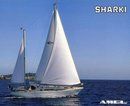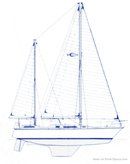Sharki
Sailboat specifications
The Sharki is a 39’2” (11.95m) cruising sailboat designed by Henri Amel (France) and Jacques Carteau (France). She was built between 1979 and 1987 by Amel (France) with 195 hulls completed.
Sharki's main features
- Model
- Sharki
- Hull type
- Monohull
- Category
- Offshore cruising sailboat
- Sailboat builder
- Sailboat designer
- Country
- France
- Construction
- Hull and deck: GRP (glass reinforced polyester)
- Number of hulls built
- 195
- First built hull
- 1979
- Last built hull
- 1987
- Appendages
- Keel : fin without bulb
- Helm
- Single helm wheel
- Rudder
- Single rudder on skeg
- Unsinkable
- No
- Trailerable
- No
- Former French navigation category
- 1
- Standard public price ex. VAT (indicative only)
- N/A €
Sharki's main dimensions
- Overall length
- 41’12.5 m
- Hull length
- 39’ 2”11.95 m
- Waterline length
- 31’ 10”9.7 m
- Beam (width)
- 11’ 10”3.6 m
- Waterline beam (width)
- 10’ 2”3.1 m
- Draft
- 6’ 1”1.85 m
- Fore freeboard
- 4’ 5”1.35 m
- Mid-ship freeboard
- 3’ 10”1.15 m
- Light displacement (MLC)
- 21385 lb9700 kg
- Ballast weight
- 7055 lb3200 kg
- French customs tonnage
- 15.34 Tx
Sharki's rig and sails
- Upwind sail area
- 818 ft²76 m²
- Downwind sail area
- 1001 ft²93 m²
- Mainsail area
- 237 ft²22 m²
- Mizzen sail area
- 108 ft²10 m²
- Mizzen staysail area
- 183 ft²17 m²
- Genoa area
- 474 ft²44 m²
- Jib area
- 344 ft²32 m²
- Symmetric spinnaker area
- 474 ft²44 m²
- Rigging type
- Ketch Marconi (in-mast furling mainsail) masthead
- Mast configuration
- Deck stepped mast
- Rotating spars
- No
- Number of levels of spreaders
- 1
- Spreaders angle
- 0 °
- Spars construction
- Aluminum spars
- Standing rigging
- 1x19 strand wire continuous
Sharki's performances
- Upwind sail area to displacementiThe ratio sail area to displacement is obtained by dividing the sail area by the boat's displaced volume to the power two-thirds.
The ratio sail area to displacement can be used to compare the relative sail plan of different sailboats no matter what their size.
Upwind: under 18 the ratio indicates a cruise oriented sailboat with limited performances especially in light wind, while over 25 it indicates a fast sailboat. - 180 ft²/T16.71 m²/T
- Downwind sail area to displacementiThe ratio sail area to displacement is obtained by dividing the sail area by the boat's displaced volume to the power two-thirds.
The ratio sail area to displacement can be used to compare the relative sail plan of different sailboats no matter what their size. - 180 ft²/T16.71 m²/T
- Displacement-length ratio (DLR)iThe Displacement Length Ratio (DLR) is a figure that points out the boat's weight compared to its waterline length. The DLR is obtained by dividing the boat's displacement in tons by the cube of one one-hundredth of the waterline length (in feet).
The DLR can be used to compare the relative mass of different sailboats no matter what their length:
a DLR less than 180 is indicative of a really light sailboat (race boat made for planning), while a DLR greater than 300 is indicative of a heavy cruising sailboat. - 301
- Ballast ratioiThe Ballast ratio is an indicator of stability; it is obtained by dividing the boat's displacement by the mass of the ballast. Since the stability depends also of the hull shapes and the position of the center of gravity, only the boats with similar ballast arrangements and hull shapes should be compared.
The higher the ballast ratio is, the greater is the stability. - 33 %
- Critical hull speediAs a ship moves in the water, it creates standing waves that oppose its movement. This effect increases dramatically the resistance when the boat reaches a speed-length ratio (speed-length ratio is the ratio between the speed in knots and the square root of the waterline length in feet) of about 1.2 (corresponding to a Froude Number of 0.35) . This very sharp rise in resistance, between speed-length ratio of 1.2 to 1.5, is insurmountable for heavy sailboats and so becomes an apparent barrier. This leads to the concept of "hull speed".
The hull speed is obtained by multiplying the square root of the waterline length (in feet) by 1.34. - 7.56 knots
Sharki's auxiliary engine
- Engine(s)
- 1 inboard engine
- Engine(s) power (min./max.)
- 40 HP / 50 HP
- Fuel type
- Diesel
- Fuel tank capacity
- 89.8 gal340 liters
Sharki's accommodations and layout
- Cockpit
- Center cockpit
- Cabin(s)
- 2
- Berth(s) (min./max.)
- 6 / 7
- Head(s)
- 1
- Freshwater tank capacity
- 198.1 gal750 liters
Similar sailboats that may interest you:
Sailboats
First built hull
Hull length
1978
45’ 4”13.8 m
1988
52’ 6”16 m
1991
40’ 1”12.22 m
1984
37’11.28 m
1996
41’ 10”12.75 m
1987
38’ 6”11.75 m
1985
32’ 10”10 m
1977
36’10.97 m
1984
42’ 4”12.9 m
1967
33’ 1”10.1 m
1978
34’ 7”10.54 m
2006
34’ 10”10.6 m
1994
37’ 1”11.31 m
1974
37’ 5”11.4 m
2006
38’ 2”11.65 m



